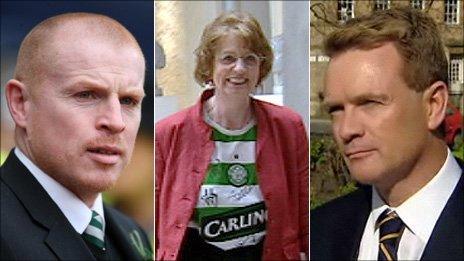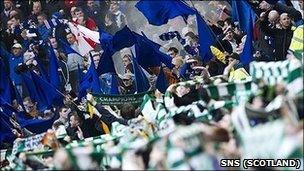Parcel bombs sent to Neil Lennon, McBride and Godman
- Published

Devices intended to "kill or maim" were sent to Neil Lennon (L), Trish Godman and Paul McBride QC
"Viable" parcel bombs have been sent to Celtic manager Neil Lennon and two high-profile fans of the Glasgow club, sources have told the BBC.
Sources said the liquid-based devices, sent in the past month, appear to have been intended to "kill or maim".
Mr Lennon's lawyer, Paul McBride QC, and former deputy presiding officer of the Scottish Parliament, Trish Godman, were the other two people targeted.
The devices were found at various locations in the west of Scotland.
Sources close to the investigation indicated they were rudimentary and did not appear to have been made by someone with paramilitary training in bomb-making.
Alex Salmond: "All people, particularly those who love football, will unite to condemn such action"
Earlier this week, media organisations, including the BBC, had agreed to a police request not to broadcast details of the bomb incidents while officers carried out inquires.
Scotland's First Minister Alex Salmond said: "Let us be quite clear - there is a major police investigation under way to ensure that the individual or individuals concerned are identified and apprehended, and then brought to book with the full force of the law.
"We will not tolerate this sort of criminality in Scotland, and as an indication of the seriousness with which we view these developments the Cabinet sub-committee met last Saturday to ensure that the police investigation has every possible support to come to a successful conclusion."
The first suspect package was intercepted by the Royal Mail in Kirkintilloch, East Dunbartonshire, on 26 March and was addressed to Mr Lennon at Celtic's training ground in nearby Lennoxtown.
Two days later a device was delivered to Labour politician Ms Godman's constituency office in Bridge of Weir, Renfrewshire. Her staff were suspicious of the package and contacted Strathclyde Police.
Detectives initially treated the two parcels as "elaborate hoaxes" designed to cause distress rather than serious injury but further analysis has led to them being reclassified as "viable explosive devices".
The third package was addressed to Mr McBride at the Faculty of Advocates in Edinburgh.
It is believed to have been posted in Ayrshire before being found in a letter box by a postal worker on Friday and taken to a Royal Mail sorting office in Kilwinning, where police were contacted.
Explosive device
Detectives are also investigating another package addressed to Neil Lennon which was found at a sorting office in Saltcoats, North Ayrshire, on 4 March but this has not been confirmed as an explosive device.
It is understood that specialist anti-terrorist officers are involved in the investigation but a source close to the inquiry said they were "not linking this to any terrorist organisation".
Henry McDonald, Ireland correspondent for the Guardian newspaper, said that made sense. "I think in terms of the main loyalist terror organisations that are now on ceasefire and say they've decommissioned, I think they'd be frankly embarrassed by this kind of thing," he said.
"They would regard it as a thing of the past and rather as an irritant and an embarrassment to loyalism so I suspect it's an individual or individuals who maybe had bomb-making experience in the past who are disgruntled and looking for hate figures."
For the past decade Neil Lennon has been such a figure.
The 39-year-old Catholic from Lurgan, County Armagh, has endured threats, abuse and violence.
He stopped playing international football for Northern Ireland in 2002 after a death threat, said to be from loyalist paramilitaries.
Lennon has also been the victim of a street attack in Glasgow and several other death threats since joining Celtic in 2000.
In January this year bullets addressed to the Celtic manager were intercepted at a sorting office in Glasgow. They appeared to have been sent from an address in Northern Ireland.
Media coverage
The BBC has been told that the three individuals appear to have been targeted after they featured, on separate occasions, in media coverage.
Mr McBride is one of the highest-profile QCs in Scotland and a well-known Celtic fan.
He has acted for the club and Mr Lennon on several occasions during disputes with the Scottish Football Association (SFA).
The advocate has also been highly critical of the SFA in its dealings with Mr Lennon and Celtic.

The Scottish Cup replay between Celtic and Rangers in March was ill-tempered
Ms Godman has a lower public profile than Mr Lennon or Mr McBride but is well known in political circles as an avid Celtic fan.
Until dissolution of the Scottish Parliament last month, she was deputy presiding officer and the Labour MSP for West Renfrewshire.
On her last day as an MSP she was pictured in the Holyrood chamber wearing a Celtic football top.
Rangers and Celtic meet for the final time this season at Ibrox this weekend in a match which could prove crucial in deciding the Scottish Premier League title.
It is understood that senior police officers are concerned about a potential rise in tension ahead of the game on Easter Sunday.
The rivalry between the two Glasgow clubs - known collectively as the Old Firm - is historically tied up in religion.
Celtic were formed in 1888 by Irish Catholic immigrants to raise funds to alleviate poverty in the city's East End.
To this day, most Celtic fans come from a Catholic background, while the majority of Rangers fans are Protestants.
Controversial match
Last month an ill-tempered Scottish Cup clash between the two sides led to political intervention.
The match saw three red cards, several touch-line and tunnel confrontations and 34 arrests inside Celtic Park and 187 outside.
After the final whistle, Mr Lennon and Rangers assistant manager Ally McCoist were involved in a confrontation.
Strathclyde Police requested a Scottish government-led summit after describing scenes at the game, which Celtic won 1-0, as "shameful".
Both clubs subsequently agreed to an action plan to tackle Old Firm-related disorder.
The fallout from the controversial match continued, however, when the Celtic manager subsequently received a ban for his actions.
McCoist had an initial two-match ban overturned, while two of his players, El-Hadji Diouf and Madjid Bougherra, were fined over their actions after the sendings off.
This prompted highly-critical comments from Mr McBride towards the SFA.
The advocate accused the organisation of being "dysfunctional", "dishonest" and "biased".
In response the governing body described the QC's remarks as "wild" and "inaccurate" and threatened to sue for defamation.
The BBC understands there have since been moves by both sides to resolve the matter out of court.
- Published8 March 2011
- Published18 January 2011
- Published12 January 2011
- Published10 January 2011